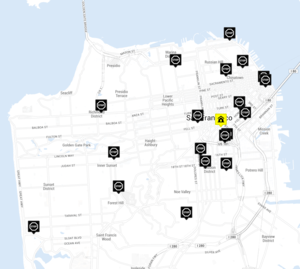Difference between revisions of "Geocoding"
m |
m (→How we geocode) |
||
| Line 7: | Line 7: | ||
While it should be obvious that each address corresponds with only one position on the planet, in real life it's not that easy. Addresses may be wrong, wrongly spelled, not complete, or not recognized at all, i.e. when they are new or renamed. That makes geocoding a difficult task, one that other services have specialized in. | While it should be obvious that each address corresponds with only one position on the planet, in real life it's not that easy. Addresses may be wrong, wrongly spelled, not complete, or not recognized at all, i.e. when they are new or renamed. That makes geocoding a difficult task, one that other services have specialized in. | ||
| − | RouteXL | + | RouteXL sends your addresses to one of these awesome third-party geocoding services: Bing, Google, Here, Mapbox, Mapquest, Nominatim and Photon. You can select your preferred geocoder in the [[options]]. There is no good or bad, each geocoder has it's own strengths and weaknesses. Their performance may vary in various regions and with various [[address format]] styles. |
=== Location based === | === Location based === | ||
Revision as of 17:13, 8 January 2016
To plan a route, the geographical positions of each of your destinations are required. All your addresses need to be translated to map coordinates. Finding an address on the map is called Geocoding.
How we geocode
While it should be obvious that each address corresponds with only one position on the planet, in real life it's not that easy. Addresses may be wrong, wrongly spelled, not complete, or not recognized at all, i.e. when they are new or renamed. That makes geocoding a difficult task, one that other services have specialized in.
RouteXL sends your addresses to one of these awesome third-party geocoding services: Bing, Google, Here, Mapbox, Mapquest, Nominatim and Photon. You can select your preferred geocoder in the options. There is no good or bad, each geocoder has it's own strengths and weaknesses. Their performance may vary in various regions and with various address format styles.
Location based
If you're in Europe you are probably not interested in addresses in the USA, unless you plan a holiday road trip. RouteXL filters some geocoding results on distance based on your location. Some geocoders use your location to bias the search results. Your location is determined by the map center.
Hint: if addresses are way off, move the map towards the approximate location.
Change settings
To improve geocoding, you can change these settings in the Options
- Select another preferred geocoder from the dropdown list.
- Fill out an address suffix, e.g. your country if you have addresses without country. The suffix will be added to all addresses before sending them to the geooding service.
- Enable precise address checking. You'll get a warning if an address did not provide a exact position, but an approximate, i.e. zip code area.
Testing
If you selected another geocoding service or added a suffix, you can test your settings using the search box. Fill out an address, or a part of it, and wait a few seconds. The search box autocompletion function will display a list of alternative addresses. If these do not appear, or the alternatives are wrong, try other settings for geocoding.
